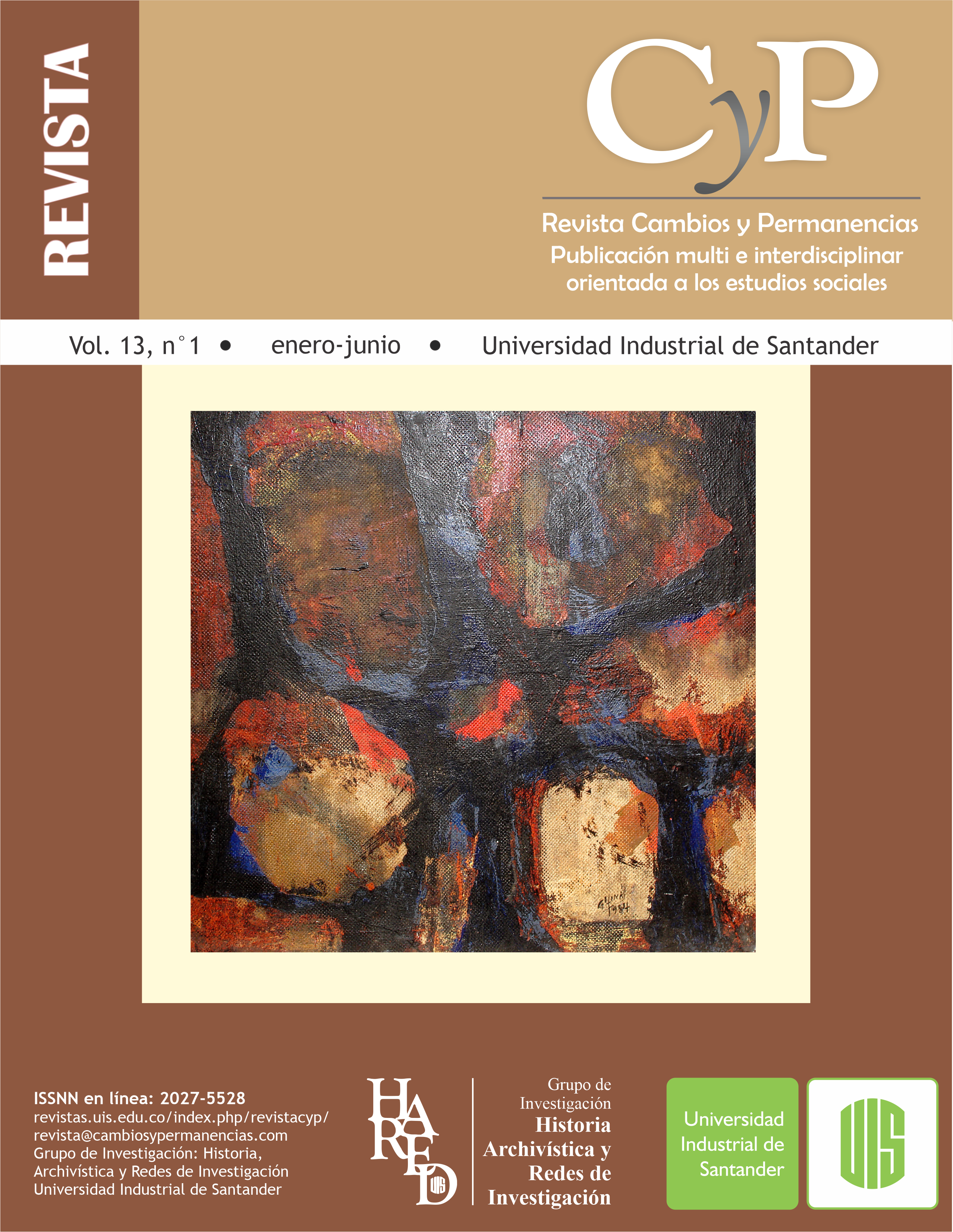The Museum of Modern Art of Bucaramanga and the rehabilitation of the urban architectural heritage
Published 2022-06-05
Keywords
- architectural heritage,
- bien de interés cultural,
- museum of art,
- heritage rehabilitation,
- cultural heritage
- urban architectural heritage ...More
How to Cite
Copyright (c) 2022 Revista Cambios y Permanencias

This work is licensed under a Creative Commons Attribution 4.0 International License.
Abstract
This article reflects on the rehabilitation of the urban architectural heritage carried out by the Museum of Modern Art of Bucaramanga Foundation– MAMB (Colombia), in a casa quinta built in 1936 in the same city. Since 1989, the Museum has been operating on this property, which, thanks to its artistic and cultural activity, made it possible for the property to be recognized as a Bien de Interés Cultural - BIC at the municipal level, guaranteeing its permanence in the city as part of the history of Bucaramanga residential houses of the first half of the 20th century. Texts that address the rehabilitation of architectural heritage as a strategy for its preservation and some existing regulations in this regard were consulted. Part of the history and functions of the MAMB in the property, related to the conservation of this building, as well as its contributions to caring for the environment given the reuse of the casa quinta and the preservation of its green areas are also disclosed. For this writing, we spoke with MAMB staff and cultural actors who are related to the history and memory of the property.
Downloads
References
- Alarcón, A. (2007). Propuesta de reconocimiento social de un proyecto cultural local: Museo de Arte Moderno de Bucaramanga [Trabajo de Grado, Universidad Industrial de Santander]. http://tangara.uis.edu.co/biblioweb/tesis/2007/124124.pdf
- Ardila, L. y Triana J. (2012). Colección de recortes de prensa del área divulgativa del Museo de Arte Moderno de Bucaramanga. 1989 – 2011: espacio biográfico institucional [Trabajo de Grado, Universidad Industrial de Santander]. http://tangara.uis.edu.co/biblioweb/tesis/2007/124124.pdf
- Barroso, E. (2022). Comunicación personal [Aplicación móvil].
- Bosch Roig, L., Valero Ramos, E., Mas Llorens, V. y Marcenac, V. (2010). La reconstrucción parcial en la rehabilitación del patrimonio arquitectónico en España desde los años 80. Arché. (4-5), 397 – 406. https://riunet.upv.es/handle/10251/31172
- Campos, G. (2020). Reseña de los conceptos: reciclaje, restauración y Rehabilitación desde el punto de vista arquitectónico. 13° Simposio de Investigación en Sistemas Constructivos Computacionales y Arquitectónicos SISCCA. http://fica.ujed.mx/Reciclaje%20%20Arquitect%C3%B3nico.pdf
- Ceballos, O. (2006). Rehabilitación de vivienda y recuperación del patrimonio construido. El Caso de Bogotá. Scripta Nova, 218(89). https://revistes.ub.edu/index.php/ScriptaNova/article/view/1296
- Cedeño, A. (2009) Restauración, reciclaje y ¿por qué no rehabilitación? Arquitecturas del Sur, 27(35), 28 – 39. http://revistas.ubiobio.cl/index.php/AS/article/view/829
- Choay, F. (2007). Alegoría del Patrimonio. Editorial Gustado Gili.
- Cogollo, M. (2021). Conversatorio “Día Mundial del Medio Ambiente en el MAMB”. [Transmisión en vivo]. Museo de Arte Moderno de Bucaramanga. https://www.facebook.com/fundacionmamb/videos/133814575410072
- Conferência Internacional sobre Conservação. (2000). Carta de Cracóvia – Princípios para a Conservação e o Restauro do Património Construído. Conferência Internacional sobre Conservação. http://www.patrimoniocultural.gov.pt/media/uploads/cc/cartadecracovia2000.pdf
- Díaz, A. (2000). La restauración de edificios como rehabilitación del Patrimonio Arquitectónico. Boletín de la Institución Fernán González, 220(78), 43-48. https://riubu.ubu.es/handle/10259.4/2108
- Encontro Luso-Brasileiro de Reabilitação Urbana (1995). Carta de Lisboa sobre a reabilitação urbana integrada. 1º Encontro Luso-Brasileiro de Reabilitação Urbana. https://conservacion.inah.gob.mx/normativa/wp-content/uploads/Documento2991.pdf
- Hernández, A. (2010). Patrimonio industrial y arte contemporáneo. Una nueva geografía cultural. Primeras Jornadas Andaluzas de Patrimonio Industrial y de la Obra Pública. https://dialnet.unirioja.es/descarga/articulo/4507670.pdf
- Ley 1185 de 2008. Ley General de Cultura. República de Colombia – Gobierno Nacional. 2008. https://www.funcionpublica.gov.co/eva/gestornormativo/norma.php?i=29324
- Ley 397 de 1997. Ley General de Cultura. República de Colombia – Gobierno Nacional. 1997. https://www.funcionpublica.gov.co/eva/gestornormativo/norma.php?i=337
- López, F. (1989). El sexto MAM. Ramírez Villamizar. Arte en Colombia, (40), 116 – 117.
- Maldonado, R. (1993). Encuentro de Artistas Santandereanos. Museo de Arte Moderno de Bucaramanga – Banco de la República. Archivo AMOVI-UIS, Colección Carlos Prada Hernández.
- Mansergas, O. (2013). El uso del patrimonio arquitectónico. Biblio 3w, 1049(11). http://www.ub.edu/geocrit/b3w-1049/b3w-1049-11.htm
- Museo de Arte Moderno Bucaramanga. (2022). [publicación electronica]. https://www.instagram.com/mambucaramanga/
- Pérez-Accino, M. B., Martín Grau, J. y Bosch Reig, I. (2011). Del comercio al arte: nuevos espacios para el arte contemporáneo. Arché, (6-7), 413-418. https://riunet.upv.es/handle/10251/34463
- Prada, C. (2020). Obras de la Colección. Museo de Arte Moderno de Bucaramanga. Museo de Arte Moderno de Bucaramanga. https://museodeartemodernodebucaramanga.com/PDFs/LibroColeccionMAMB.pdf
- Prada, C. (2022). Comunicación personal [Aplicación móvil].
- Resolución 0757 de 2012. Alcaldía de Bucaramanga. Archivo MAMB.
- Rodríguez, J. (2012). Caracterización del poblamiento y la metropolización del territorio del Área Metropolitana de Bucaramanga. Iustitia, (10), 9 – 50. https://doi.org/10.15332/iust.v0i10.876
- Rueda, N. y Álvarez, J. (2001). Historia Urbana de Bucaramanga. 1900 – 1930. Universidad Industrial de Santander.
- Soria, F. (2021). La reutilización del patrimonio construido, nuevos usos, buenas prácticas. Revista PH, (104), 144-162. https://doi.org/10.33349/2021.104.4958
- Soria, F. y Guerreo, L. (2016). El proyecto de reutilización arquitectónica: hacia una valoración ampliada del patrimonio edificado. Academia, 7(13), 126 – 143. http://dx.doi.org/10.22201/fa.2007252Xp.2016.13.56314
- Torres, C. (2014). La rehabilitación arquitectónica planificada. ARQ (Santiago), (88), 30 – 35. http://dx.doi.org/10.4067/S0717-69962014000300006
- Traba, M. (1974). Beatriz González. Revista Eco, (169), 65-73. https://www.eltiempo.com/archivo/documento/CMS-10784544
- Villar, J. (2014). La reutilización, un reto para la conservación del patrimonio. El Museo del Ferrocarril Jesús García Corona de San Luís Potosí en C. Ettinger y E. de Anda (comps.), Patrimonio Arquitectura del Siglo XX. Intervención y valoración (pp. 133-148). Universidad Michoacana de San Nicolás de Hidalgo.
